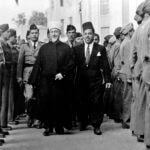
“In his new book, Hope & Scorn: Eggheads, Experts, and Elites in American Politics, historian Michael J. Brown adeptly probes questions such as these as he delves into ‘the uncertain role of intellectuals in a democracy.'”
What is the rightful role of the intellectual in a democratic society? In a polity premised on human equality and committed to majority rule, what exactly are intellectuals, those peculiar elites committed to the life of the mind and the health of the body politic, to do? What ought their fellow citizens allow them to do? At what point do such elites’ ability to drive public conversations and exert control over the levers of governmental and cultural power begin to run contrary to democratic principles?
In his new book, Hope & Scorn: Eggheads, Experts, and Elites in American Politics, Rochester Institute of Technology historian Michael J. Brown adeptly probes questions such as these as he delves into “the uncertain role of intellectuals in a democracy.” By examining a swath of post-World War II debates regarding the rightful role of intellectuals in American democracy, Brown’s history sketches out a number of potential paths and pitfalls of intellectual engagement in a democratic polity like ours. In doing so, Brown, unfortunately, does not focus enough on the most important thing an intellectual can do within a liberal democracy: simply to speak the truth as he or she sees it.
Questions of anti-democratic, intellectual elitism are important and worth reckoning with, as Brown does throughout the entirety of Hope & Scorn. However, excessive focus on the potential anti-democratic dangers of intellectualism elides the fact that in contemporary American political life, the real danger we confront is not the overpowering of democracy by intellectual elites but, rather, the quashing of said elites by democracy. By speaking the truth as they see it, intellectuals can serve as models for the independence of thought, reason, and logic that are the markers of sound, reflective citizenship. Intellectuals can nudge their fellow citizens—through both implicit example and explicit argumentation—out of reflexive partisanship, emotive politics, or absence from political deliberation and towards political engagement that couples moral principle with reason and prudence. Understood as such, robust intellectualism and democratic equality might not be at odds after all.
The first subject of Brown’s postwar case studies, Columbia University historian Richard Hofstadter, was most attuned to the danger that mass democracy could pose to the life of the mind. In Hofstadter’s view, writes Brown, popular democracy “made intellect vulnerable in America. Its values were at odds with intellectual values, and its growth had often presaged intellect’s decline.” For Hofstadter, intellectualism consisted of critical thinking and the freedom to go wherever the mind may lead—values that he pitted against the anti-intellectual, group think-prone, emotion-ridden democratic masses. Admittedly, Hofstadter’s conception of the relationship between intellectualism and democracy—a relationship marked above all by tension—could have “elitist implications,” as Brown notes.
But it need not. One can imagine Hofstadterian worries about mass democracy’s ability to overpower critical thinking translating not so much into condescending elitism but, rather, into a vigorous, self-conscious commitment on the part of intellectuals to stay true to the life of the min (and the principles of independent reasoning and logic that define it) no matter how unpopular or controversial their conclusions and opinions may prove. Intellectuals are intellectuals by virtue of their willingness and ability to, in the words of Noam Chomsky, “speak the truth and expose lies.” They ought to do so. Yet, as simple as this may sound, a nagging question permeating the debates of which Brown writes is how intellectuals ought to go about completing this seemingly straightforward yet actually complex task.
The careers of H. Stuart Hughes and Arthur Schlesinger, Jr. provide two distinct answers to this question. Both mid-20th century Harvard professors, Hughes and Schlesinger translated their intellectual commitments into direct political action. For Hughes, this meant running as an idealistic, left-wing, nuclear weaponry-averse, independent United States Senate candidate for Massachusetts in 1962 during the heat of the Cold War. Inspired by C. Wright Mills’s calls for intellectuals to commit themselves more vigorously and openly to public activism in the face of potential nuclear destruction, Hughes confronted head-on the tradeoff between the clarity of one’s message and the influence and popularity thereof. His campaign was more educative than vote-getting; Brown writes that Hughes sought to engender “expertise and moral consciousness” within the people themselves. Thus, Hughes provides readers with a quintessential example of intellectual political engagement that held the grubby necessities of politics (kowtowing at least a bit to majority opinion, for example) at bay in favor of staying true to the reasoned, principled commitments and policy prescriptions to which the intellectual’s own academic career had led him.
Chomsky viewed the likes of Schlesinger as “new mandarins”—intellectuals who had forsaken intellectual commitments for the sake of proximity to power.
While Hughes hewed towards intellectual purity and moral clarity at the expense of political influence (he only received about 2% of the vote in his Senate bid), Schlesinger denied the existence of such a tradeoff by virtue of his unique intellectual posture. Brown relates that Schlesinger was greatly influenced by thinkers like Reinhold Niebuhr. Indeed, Schlesinger’s was a “tempered” liberalism, one that was highly attuned to the realities of irony and complexity in human affairs. Schlesinger’s worldview, reminiscent of like-minded liberal scholars turned statesmen like Daniel Patrick Moynihan, lent itself to the rationalization, even commendation, of close ties between intellectualism and political action. Schlesinger saw a world rife with tradeoffs, such that intellectuals like himself shouldering the burdens of power—as he himself did as a member of the Kennedy administration—was less of a compromise of intellectual ideals and more of a taking on of one’s responsibility. As Brown writes, for Schlesinger, “the intellectual’s place was in the melee of politics and events.” The life of the mind was not filled with moral absolutes and reasoned certainties for Schlesinger. As such, putting that mind to work in the service of politics—where such absolutes and certainties are awfully hard to come by—was not a betrayal of intellectual commitments but rather the acceptance of public duty.
Certain thinkers were far less comfortable than Schlesinger with the proximity of intellectuals like himself to the levers of power. Such critics—Noam Chomsky, most notably—were most strident in their condemnations of the willingness of intellectuals turned statesmen like Schlesinger to aid, abet, and rationalize what they saw as unjust—indeed, evil—American imperialism. Brown expertly lays out how, in Chomsky’s eyes, intellectuals had a unique responsibility to expose governmental lies and less than savory dealings thanks to the unique resources (such as the leisure to investigate, research, and write) to which they lay claim. Chomsky viewed the likes of Schlesinger as “new mandarins”—intellectuals who had forsaken intellectual commitments for the sake of proximity to power. As Brown writes, “Their unique opportunity to find and speak truth is what made it so damning, in Chomsky’s eyes, for new mandarins to serve power.”
Despite their immense disagreements and mutual contempt for one another, both Chomsky and Schlesinger were staying true to the ideals of intellectualism—speaking the truth as best they saw it, guided by the lights of reason, logic, and principle. Chomsky and Schlesinger’s clashes were not the result of differing moral weights being placed on values like purity versus public action; they were downstream consequences of fundamentally differing worldviews. One readily accepted the existence of moral gray areas and tradeoffs (Schlesinger), while the other was far more skeptical of power itself in a world brimming with moral absolutes (Chomsky). Theirs was, at its core, an intellectual bout, and both men went about making their case in word and deed. That Chomsky did so via activism and Schlesinger through government service was not evidence of one or the other betraying the dictates of intellectualism. Rather, it betrayed the substantive, conflictual upshot of two worldviews—two products of study and reasoning—that were fundamentally at odds.
This is not to say that mid-20th century intellectualism constituted a flawless model of intellectual engagement in the public square. In his chapter on African American intellectuals like Cornel West, bell hooks, Henry Louis Gates, Jr., and others who gained prominence in the 1990s, Brown underscores the fact that the realm of intellectual activity had long excluded marginalized groups of Americans. These black “public intellectuals,” moreover, strove to break out of elite conclaves and ground their intellectualism in the lived experience of citizens—particularly those living on the margins of American democracy. At a time when many were worried that the role of the public intellectual had all but disappeared in the face of enhanced academic specialization, intellectuals like West “argued for a shift in the locus of intellectual life—from the rarified air of the Tenth,” as in W.E.B. DuBois’s “Talented Tenth,” to the “everyday environs of ordinary people.”
This self-conscious, democratic turn of intellectualism ought to be celebrated not only from the perspective of democracy, as it aimed to bridge the gap between the citizenry and intellectual elites, but also from the perspective of truth-seeking, since grounding arguments in lived experience often proves a boon to the cause of assessing and speaking the facts of various matters.
West’s and others’ calls for intellectualism to be tethered to reality might indicate that Chomsky-style gripes with intellectuals’ (like Schlesinger’s) willingness to partake in power politics and actual governance might be somewhat off base. No intellectual made this case more forcefully than Irving Kristol, the “intellectual against intellectuals,” to use Brown’s phrasing. Kristol’s neoconservatism stood up against the chic radicalism of “the new class” intellectuals who overlooked the blessings of American constitutionalism, the market economy, and Western civilization in favor of utopic visions of social harmony. For Kristol, getting professors out of the faculty lounge and into the room where it happens was far from a threat to democratic governance. Rather, it would foster a more realistic and more truthful intellectual climate. He wrote: “our best minds need to be chastened by some first-hand experience in…governing.” If the role of the intellectual is to seek and speak the truth, then coupling experience with study is not a threat but a boon to intellectualism.
Understood as such, intellectuals’ commitment “to shout the truth in the face of the mob” and to act on that truth, in the words of Kristol, could not be further from an anti-democratic undertaking.
Debates about the work of intellectualism itself aside, the goal of Brown’s book is not to examine the optimal function of an intellectual on its own terms but, instead, in the context of democratic politics. Today, one could be forgiven for mistaking the timidity of so many intellectuals—on both the political left and right—for the small-d democratic commitments articulated by the likes of West. Much of America’s contemporary intellectual product, as showcased in leading op-ed pages, long-form think pieces, and books consists of far more rationalization than reason. Whether it be apologists for former President Donald Trump on the Right or left-leaning writers self-censoring in fear of upsetting woke orthodoxies, many of our most gifted thinkers have proven themselves to be less committed to the dictates of reason than commandeered by certain passionate and vocal ideological minorities.
The full-throated recovery of intellectual independence on the part of our intellectuals, at first glance, would seem to come at the expense of democracy, broadly defined. But it would be wrong to equate democratic self-government, at least in its optimal state, with the sort of mobocratic, mass peer pressure that inflicts much of our body politic and the intellectuals operating within it.
At its best, a robust system of self-government is the result of individual citizens’ independent reasoning and interests clashing with one another and then being sorted out and harmonized in the course of debate in the public square and in the halls of legislative and executive power. Uniquely equipped with the time and resources to partake in such reasoning and debate, intellectuals can and should serve as exemplars of the sort of advocacy and argumentation—tethered to moral principle, logic, and reality—that befits a reflective, self-governing citizen.
Understood as such, intellectuals’ commitment “to shout the truth in the face of the mob” and to act on that truth, in the words of Kristol, could not be further from an anti-democratic undertaking. By staying true to the truth-seeking mission of intellectualism, intellectuals can enrich democratic debate and the self-governing character of the nation. While intellectuals have long occupied a hotly contested role in American democracy, as outlined by Brown, it might be high time that they embrace their role with renewed vigor. Doing so might prove a necessary first step towards revivifying American democracy and reminding citizens of the need to take up the eminently necessary, difficult work of self-governance themselves.
Thomas Koenig is a recent graduate of Princeton University and will be attending Harvard Law School in the fall of 2021. He can be found on Twitter @TomsTakes98










